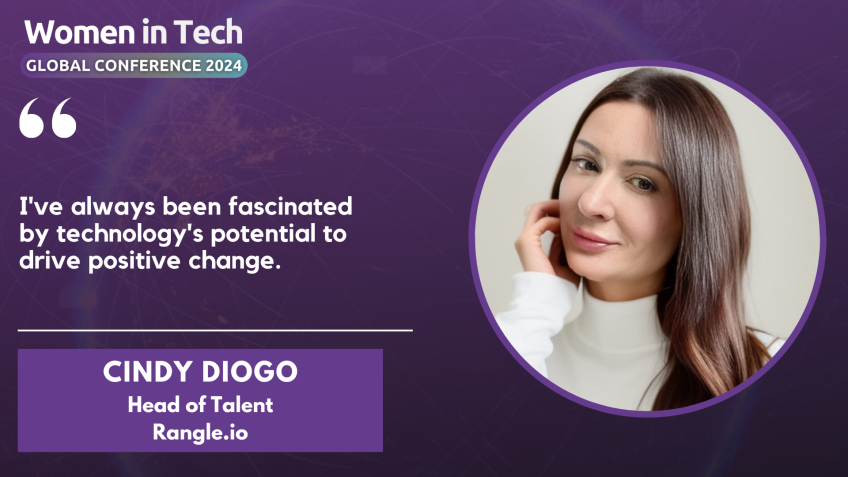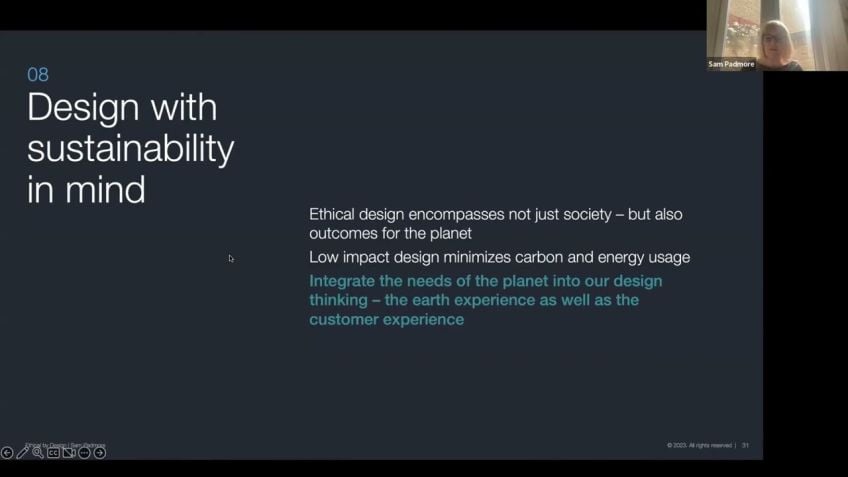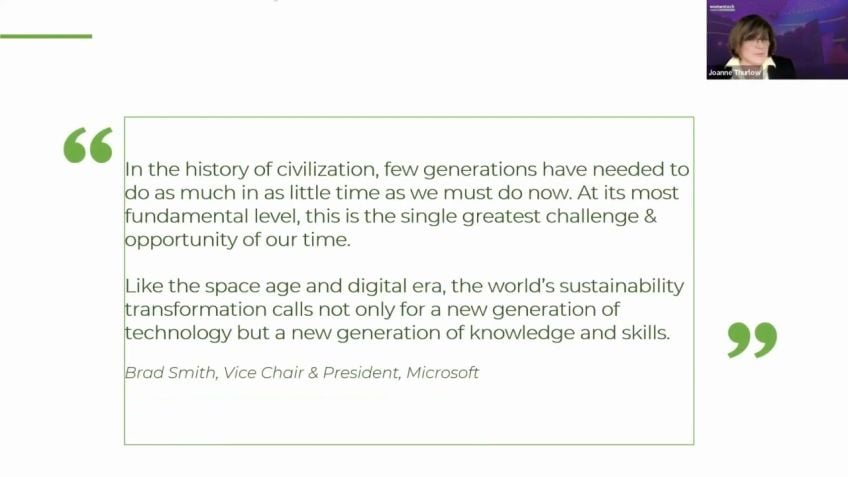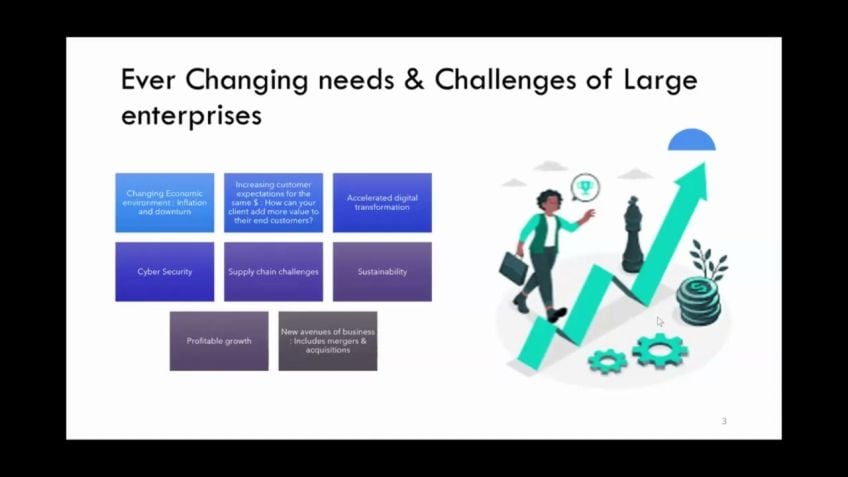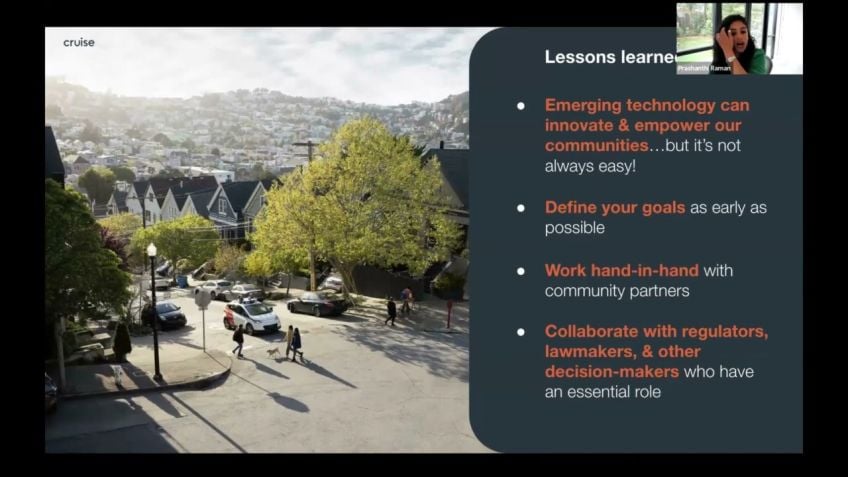Sustainable Energy 101– A beginner’s guide to the technologies helping to save the planet
The Fight to Save our Planet: A Deep Dive into Sustainability
Climate change, sustainability, carbon neutrality, greenhouse gases, these are terms we frequently hear these days. Given our planet's present threats and challenges, more discussions revolve around sustainability and living sustainably. Through this talk, we delve into various aspects of sustainability, from data and data center impacts, including the thought process that needs to go into adapting an existing business or household to a 'greener' alternative, to, the effect of electric transport, highlighting various challenges and solutions at both the industrial and personal level.
The Race Against Time
With the present state of our planet under serious threat due to carbon emissions, nations, businesses, and individuals find themselves in a race against time to save the planet. The objective is to achieve 'net zero' targets where the number of carbon emissions released into the atmosphere is offset by carbon credits or savings elsewhere by the year 2050.
These targets originate from the Paris Accord's aim to curb the impact of climate change by ensuring there is no more than 2% increase in carbon emissions. This, however, does not imply that by 2050, if all net zero targets are met, all issues and challenges will be eradicated. Nonetheless, it would stabilize the position and provide a platform to improve.
The Role of Renewable Energies
Considering the swiftly increasing demand for energy, actions that can provide immediate impact are needed while transitioning to new technologies, like hydrogen and other renewable energies. These alternatives have to be efficient enough to save the environment within a reasonable timeframe.
However, employing renewable energy means overcoming various hurdles. For instance, using solar panels to supplement energy might run into problems such as inadequate roof space for installation, safety concerns with high-voltage cables, or complications selling excess energy back to the grid. These factors make it important to ensure sustainability goals are practical and the return on investment warrants the switch.
The Effort Towards Sustainability
Moving towards sustainability and achieving 'net zero' targets are tasks that everyone, from individuals, investors, researchers, to governments, needs to play a part in. Certain industries have already started making strides in this direction. For instance, in Norway, the introduction of battery-operated car ferries could result in a reduction of up to 300,000 tons of CO2 emissions annually once 70-80 electric ferries are operational.
In essence, sustainability needs to be a culture embedded within individuals and businesses. By understanding and appreciating the importance of each seeming drop in the sustainability bucket, we continually make the transition towards greener and more efficient ways of living. Remarkable ideas and innovative technologies are beginning to surface as society collaboratively functions towards reaching these targets.
Conclusion
To tackle the challenges effectively, society must bring sustainability awareness to a personal level. A change in perspective is required so that people do not consider adopting greener practices as a tedious obligation, but a personal war to win against climate change. Remember, every small action towards living sustainably can contribute to the bigger picture – a viable Earth for the future.
Video Transcription
Thank you very much for joining me today. I know that with this conference, there is a lot of, there are a lot of sessions underway right now. Um We have about 20 minutes uh in which I can talk to you about sustainability and living sustainability today.So thank you for choosing to spend a little bit of time with me. And hopefully you're going to find this um helpful and I need to go over to my presentation. So if you're asking questions in the um chat right now, I can't actually see it because I only have the one screen. So I will and we go from there. I see. OK, so I will come back to you at the end of it if there's any specific questions? Ok, great. Thank you k today every day when we turn on the radio or we're listening to the, listening to the radio or watching TV, or on the internet, all we hear about is the climate, climate change, sustainability, carbon neutral, greenhouse gasses. And for good reason because right now our world is, our planet is under a threat that it has never faced before by the carbon emissions that are, that are occurring.
And as a result of that, um there is a race to save the planet as it says here, there is no planet B we don't have any other options. And the way to save the planet is categorized or captured in the net zero targets that most countries, companies, governments and individuals are committing to. And those of the t that is the target, what net zero refers to is that by 2050 the goal or the target is, is that the number of carbon emissions that get extra, at least into the air are offset by carbon credits or carbon savings elsewhere. And one of the bases for that net zero is the Paris Accord in which the overall target is that there would not be an increase of more than 2% in carbon emissions overall for us to be able to get the current impact of climate change under control and then to start to step it back now, that does not mean that by 2050 if everybody made the net zero targets that there are not still going to be issues and challenges, there certainly will be, but it means that we'll be at a state, we'll be able to stabilize things and then start to, to move forward.
Now there is a lot of things ongoing during this time period with um the industry and, and around the world. I mean, it's, it is how do we take and do activities today that we can have an immediate impact whilst we make the transition to the newer tech technologies like hydrogen, for example, or the other um renewable energies which have less impact because that is going to take time.
So sorry. Now the demand for energy today is only going to increase. Currently, there's around 8 billion people in the world that have a need for energy. There's an estimated 770 million people who don't even have access to energy today on a consistent or at all basis. And the demand is expected to increase by 50% plus in the next two decades alone. So what does that mean? It means that we have a very, very big challenge. So while the demand is going up and we're trying to bring the emissions down and the technologies are not there to offset everything. It's a challenge and these are some of the drivers and the demands around energy consumption today. And this is a big topic when I get to discuss when I get into preparing for this presentation, the many facets and aspects of sustainable energy of living sustainability today, touch on every part of our society and their lives. Now, these are just some of the terms often are associated to this topic and obviously at the core of it is the environment, things like how is COVID impacting climate change today? Well, with all of us working at home. Whilst we're not traveling, we're having some carbon emission savings, but we're working at home and that means we're working virtually. And that ties into a lot of contributes to digitalization, big data, internet of things, the demand for more and more data consumption on a ongoing basis.
There are a lot of other variables that are, are impacted here as well such as geopolitics, um social dynamics. You have global trends, you know, it, it is very complicated because of the complexity of this topic and the scope of it. It's to think about what are we able to do today, that we can be making a difference. So I'm going to focus in on two particular areas with you to discuss and that's the impact of the data and data centers and electric transport and how it's how it's helping us go forward. But just before we get to that point, I'm going to just step back for a moment and introduce myself and why I'm speaking on this topic. Um I work for Stevens Energy and obviously by the name, energy is at our core and we are leading the energy transformation as we go forward into the future and the area that I'm responsible, I'm part of the Industrial Application Solutions Business Unit within Seamen's Energy where I'm the head of it in my business unit, we focus on producing solutions for multiple vertical markets including oil and gas and predominantly oil and gas and marine.
So obviously, this is a topic that is very near and dear to what my business does and, and my business is my business unit alone. We have around 3700 people around the globe in 40 countries working on the different technologies and engineering solutions accordingly. I also on a personal note, I had recently in the last six months, moved to the isle of man. Um Well, I have just recently accepted my first appointment to an executive board here with Digital Homan Agency. That's um a board that is a combination of industry and government to set out the digital or the tech strategies for the island, both on and off island for, for the economy going forward. And I'm also a member of the Love Tech Committee here which is focused on promoting um the stem career opportunities to young women and girls as a way forward. And that's an area that I'm very passionate about as well. But most importantly, what I'd like for you to know about myself is I am like everybody else today when I'm at home. Although I work in the industry when I'm at home every day, I'm wondering, am I making a difference? Um And what I want you to take away from this presentation is that there are a lot of challenges in creating a sustainable energy world.
And quite often when we introduce one solution, we're introducing multiple challenges to that solution, which I'll touch on in a moment and I'll do that through the illustration of a data center that exists today. And some of the challenges that they have in, in trying to create a more sustainable environment um in, in their business. And we'll take a look at electric transportation, in particular electric ferries that are being used in Norway and how that's also having an impact on business.
And finally, we'll talk a little bit um take a quick look at how we as individuals and as tech workers and businesses can actually start to make an impact on things. I haven't said that I'd like to introduce you to a gentleman by the name of Phil Acock, who is the CTO of domiciling, which is a global hosting solution provider located here on the Isle of Man. No, I actually chose to use a company or a business like Damali who is a data center provider rather than the Amazons and the, and the, and the um Microsoft and, and Googles of the world because I think it's important that we understand both at an individual and at a business level, what those challenges are.
And certainly in Amazon is in a completely different situation of challenging or or addressing the renewable issues in their own environment than most businesses would face today. The dome is a poet for because it's a global audience for those of you who are not aware of where the isle of man is and that could be many. Um It is actually a small island in the middle of the Irish Sea located between Ireland and the UK. It's a small island within a very big global impact in terms of its presence into many different markets. And Doyle, which was one of the first um they've been in business since 91 is one of the first ISP projects in Europe and moved on to creating more and more um building a higher and data center, which is pictured here as you can see. And today they are providing data center services, not only based here on the isle of man, but globally. And they have a footprint around the world and they handle several billion us dollars worth of transactions every month through their data centers. They were also very forward thinking when they started building their first data center um 1516 years ago. And at that time when they were building the data center, they started asking questions of the main data centers for best practice at that time.
And they also went to the research environment in the universities and said, you know, what are the trends coming up in 1520 years that we can reflect in our environment today? This being in 2006. And they incorporated some technologies at that time such as air exchange, free cooling by bringing in the cooler air from outside so that they don't have to run their air conditioners, uh air condition, yeah, air conditioners um recycling the heated air from the data center into the office environment to also reduce the demands on their electricity, refurbishing the building rather than building from new.
And what was really important with all of this is that even then they were looking at it. So again, being forward thinking, moving forward, they have started to look at what would it take. And Phil has been looking at both from a personal perspective, as well as a business perspective. What does it take to retrofit your environment today? Taking advantage of the renewable technology today in order to offset your energy demands or your carbon footprint and what has come out of it? And it's been in the same challenges that, that whether it's at home or in the business environment that you're faced with and that is, is it a viable solution? Let's say you're gonna adopt solar panels. So you know, do you have enough solar panels? Will they generate the type of demand that you need to, to meet? Will they generate enough energy to meet your demand? Do you have enough roof space to put all those solar panels on? Um If you're talking about a business such as the Tata Center, which the roof would not be enough for the solar panels and you wanted to put a solar panel farm in behind to supplement your businesses demands, then you have considerations such as high voltage cables which can cause safety concerns, which then leads to issues with insurance insurers.
It might result in issues with the utility companies and, and are trying to put your excess energy out onto the grid. Would you create too much of a spike that it would cause problems for them down the road? If you have solar panels at home and you're looking to sell on your energy excess energy that you're generating and put it onto the grid. Do your utility companies make it viable for you? Do they offer you enough? Do they even accept it? So the point being that when you're looking even today at bringing and supplementing your energy by renewals, yes, there are options there and in some cases, it may be a viable one but you have to do your work to, to take a look at it. And today not in every instance because it is very much an individual thing. Is it going to be viable um in the longer term that you get your return on investment. So, although we can do it, it's not always readily doable what becomes really important in a data center as well as in other areas is actually starting to measure those carbon emissions. And this is going to become more and more of a topic going forward because it's the investors and the banks and the boards are not only saying to companies, you know, tell us that you what your targets are going to be, they're actually saying prove to us that you're making your sustainable targets.
Um because there is a term called brainwashing in which there's a lot of companies that it comes down to the marketing more than anything. So that desire to try to measure from end to end of what type of emissions that you might or energy you might be using and what those emissions might be becomes really important. And one of the areas where this is being measured is with um electric ferries in Norway. Now, this is the Ampera which is one of the first battery operated car ferries work in the fjords of Norway. Um And the battery, it's electric, the battery cell that it's using is produced by my business specifically. And to give you a bit of an idea as to how just going on to that type of technology, the carbon footprint reduction of the ferries that are being implemented in Norway in the next year could result in reductions up to 300,000 tons of co two emissions in a year by having 70 to 80 of these electric ferries on board.
So you can see where, although there's a certain amount of carbon created and produced in the ferry in the ferries that by the time you get it into production and over time that that is worth it. And that's what's known as your carb paying off your carbon debt if you will. So at the end of the day, this as you can gather, this is a very wide topic. Um and making sustainability happen is not going to be an easy thing. Everybody has a part to play in it, whether you're an individual, business, industry investors by driving accountability, academia or government through policy and governance. Everybody has a part to play in ensuring that we create and meet our net zero targets. And as often I use the analogy, it's like having a big barrel that you're trying to fill up with water one drop at a time. And that barrel has some leaks in some holes. Will you ever get the barrel filled? I believe we will as a society fill that barrel and get it to overflow. But it is gonna take a lot of innovative technologies, a lot of transcend work and working together as a society at a global level to actually make this happen. Thank you. OK, great. Um Now, did any of you have any questions? Um It's, it's such a big topic when we talk about sustainability and, and impacting. Um You know, when you're saying, OK, do that recycling and um um I'm not sure what the exact actually. That's a really good question.
What is the CO2 level in the UK? And I'm not sure what the specific UK levels are in any of the different countries. Um What do I do on an individual level to be more sustainable? Uh what I try to do, I mean, if we think about, if you just take your phones today, how much data do we have on our phones? Do we store in a cloud? Um, which ultimately ends up on a data center somewhere. So, what I try to do is I tried to reduce the demands. Again. It's one of those drops in the bucket by offloading anything I don't use on a regular basis on to say USB sticks and so on. So that way it's not out in the cloud. I make sure that I am turning off my power because there is that whole vampire um impact of of when you still have devices on and your charger that it's fully sucking things away. Um uh That is for the second away. So I try to make sure that I'm always turning things off as I go along and, and it are, it is those basic things that we learn about, you know, like the dripping of a tap and it's trying to be aware as to how it works its way back. Ok. How do I feel about this synergy of energy and green power, nuclear energy and green power on a personal level? Would I like to see a move away from any dependency on nuclear energy? Yes, I don't think that's gonna happen right away.
It's going to take time to transition. And the reason why the reason why I say that is because with nuclear energy if it goes wrong and yes, it's a very secure type of energy, but if it goes wrong, it goes really wrong and the the ultimate impact of that. So what I like to see that we are eventually transition to all green energies. Preferably, yes, because I think that's best for our, for our environment. Um the types of energies that are coming up in terms of green, I mean, you have hydrogen, there's a lot of work being done on sub sea and wave technology, wind technology. So you know, and the solar, but it has to become more efficient so that it can offset things like nuclear for, for my business. A lot of it ends up being in um focused on obviously oil and gas at this point in time, he ses energy stepped away from nuclear a while back. Yeah, I I agree to the end.
Um I think more clarity to the to defining sustainable actions and what is sustainable is very much needed. It is a big topic that most people, I mean, I'm working in the industry and the amount of learning that I have to do myself to understand all of this is quite extensive. And if you're thinking of the average person at home, it's not. And how do you make it personal? I think that's one of the challenges that we have ahead with this topic is is it's not just the technologies from the industry side of understanding what they are and we can talk about greenhouse gasses and so on. But if I think about my mother sitting at home, my 85 year old mother, what does she understand about sustainability and, and its impact? Um How do you get her to start to practice it on a daily basis? Because I think it's really important if we're doing it at home and our businesses, as I, as I mentioned this slide here, if you know, from a business perspective, it's creating a sustainable culture that we bring that into that and, and we'll bring it from home, we'll do it in our business and, and it starts to roll up.
So I think it's very much a top down and a bottom up perspective. Yeah. Now that's an interesting point. A why factor that drives us? Iii I agree. I, I think that's really important. Why we have to make it personal, don't we? And, and that type of, of education um at an industry level, we're talking to businesses, we're not taking it down to a personal level, but I think that there's a lot to be done to, to bring it. Yeah. Why, why? And it gets very emotional and, and one of the challenges I think with putting the, why is that so much of it is seen as you're that tree hugger, you know, that very green person with, you know, Birkenstock sandals and, and, and wool socks on or something along those lines. I think there's still a large part of society, at least in the western world that sees it that way. So being green is not necessarily, you know, it might have a certain persona to it. And I think again, it, it, it needs to be remarketed a little bit um, to, to, to bring it home for people. Yeah, it's, um, it is a challenge and it is disconcerting when you o obviously, it's very worrying when you see what's happening in the environment today. Um especially things you see the amount of plastics in the, in the oceans and the river was just that one alone and some of the approaches that are being taken by governments and, and so on and there's a lot of really creative ideas out there and it's a conversation that definitely has to happen on a higher level, more frequent, but maybe in a slightly different way and it does need to be done at all levels.
Great. Any other questions or comments? It was, it's a bit of a challenge during a talk like this because it is so multilevels um where we're at. But you know, depending on our data centers and a digitalization. Here's another example, one of the things that we do in our business is we do a lot of digital twins and that saves a lot that you don't have to travel, say out to an oil rig offshore, you can monitor it through the internet of things and sensors and create these digital um digital twins and, and you can by doing and, and mimicking those processes.
For example, in our gas turbines, we're able to test out designs of gas turbines without ever starting them up until the very end. So that saves considerably because you're not, it's a term referred to as firing up and we're not firing them up at that point in time. So we reduced that. But again, that's a lot of data that goes on to those data centers which in its own, right at the back end, actually generates or has a lot of energy demands at the same time. And I think we we that when we talk about awareness, um I think it's important that people are aware that that's the reality of it. And 70 to 80% of energy today is still produced by fossil based fuels. And in 2050 there will still be a large percentage of fossil based fuels generating that energy. But we will be making the transition to things like liquid, liquid natural gas, uh hydrogen and some of the other technologies that are coming. I think we'll get there. Certainly, people are listening more today, but there's a lot of work to be done and a lot of awareness and the clock is ticking for us for sure. But I'm pretty sure we'll get that, that bill filled up and overflowing. Thank you? Any other comments or questions? Hey, Beatrix. Hi, thank you. Great. Then I think I've gone over my 20 minutes. Um, it's meant to be a 20 minute chat. I think I've gone over it.
So if there's not any other questions, um, at this point in time, I thank you very much for taking time again to join and to listen in on what I feel is a very important topic. You're welcome, Natalia. And I really hope all of you are enjoying the conference. Um For those of you who are here for the first time, just a word on this conference. I was here last year as well. And it's a really terrific event and, and please take advantage of it. There's so many great sessions to join in and uh to, to, to listen in and people make use of the Slack um the Slack platform and, and the other ones as well um to really get a lot out of it. It's a fantastic conference. So again, thank you very much for your time and please enjoy the rest of the conference. Take care everybody.

